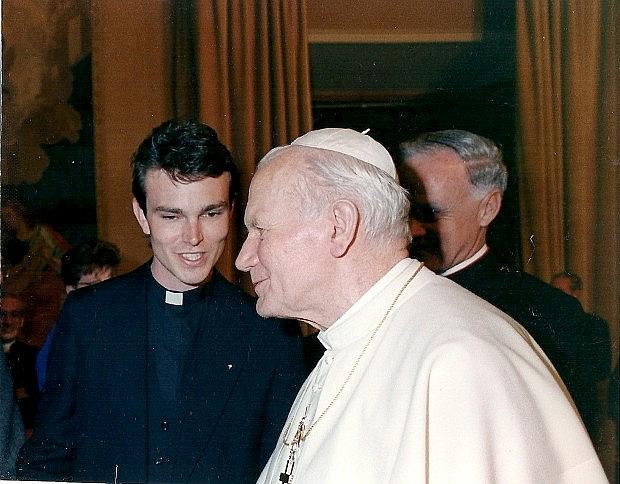Former priest: 'I got the cue he's falling in love with me'
Montana native D Gregory Smith felt alone, helpless and suicidal as a teen about feelings for other young men. He became a priest hoping to turn off his sexuality, but ultimately decided to come out as a gay man. He now counsels LGBT high school and college students and gay men.
Billings Gazette health reporter Cindy Uken is a 2012 National Health Journalism Fellow. This article is part of a series examining the suicide epidemic in Montana. Other stories in this series include:
Keep condolences to suicide survivor simple, such as, 'I'm sorry for your loss'
Suicide victims' loved ones often suffer guilt, thinking 'If only I had ...'
Suicide survivor: 'There was really no help for me and no hope'
Teenage girl fatally shoots herself days before '08 school year begins
Before a suicide, a mother's lament: 'Why can't I fix this?'
Miles City school administrators tackle problem of suicide
Play designed to help youth feel comfortable discussing suicide, feelings of despair
Suicide is 2nd leading cause of death among Montana youth
Veterans twice as likely to commit suicide as civilians
Police officer: 'Ma'am, I found your husband'
Veteran: 'I just always hoped that I would be in that freak car accident'
Suicide rate among Montana's senior citizens outpaces national figure
Veteran: 'You're taught in the military that you don't ask for help'
Suicide survivor: 'There was a butcher knife in her chest. I just went berserk.'

BOZEMAN – As a 13-year-old Catholic boy growing up in Twin Bridges, population less than 400, D Gregory Smith knew he was different from other boys his age.
His hormones were ablaze, kindled by his attraction to other boys and men.
It was the 1970s. There was no Internet. There were no TV characters that seemed to support what he was feeling.
"The only thing I knew was that it seemed wrong because nobody else had those feelings,” said Smith, now 47. “I grew to understand that both church and society frowned on people who were gay and that it wasn’t OK.”
As a young teenager, Smith felt hopeless. He feared he would shame himself and his family if he could not squelch his attraction to other males. He felt there was no place in the world for him.
“I felt my life was going to be very painful, that it was wrong, that God didn’t want that for me, that it was not good,” Smith said. “I also knew I could never get rid of those feelings. They were part of me.”
In Smith’s mind, his only option was to remove himself from the picture. He swallowed a cocktail of pills.
He did not necessarily want to die. He simply wanted to avoid the shame and pain associated with being gay.
His suicide attempt failed. He awoke the next morning with a stomach ache, causing him to miss a day of school.
By 14, the self-described “skinny, scrawny” Smith, who excelled at debate, music, speech and theater, decided to become a Roman Catholic priest. There, he would not have to be gay or straight. He could simply be.
“It took me out of the running,” Smith said. “I was off limits for everybody. I could be everybody’s friend and just do my thing. It was the one place I could be special without having to fit in.”
He went on to attend the seminary at age 22 and was ordained in 1991 when he was 26. He served as a priest for seven years in Helena and at Our Lady of the Valley in Helena Valley.
“It almost was so painful to be with myself that I found it really, really important to find meaning outside of myself in serving others,” he said.
It also felt “safe,” he said.
“There’s a certain lack of sexuality about celibacy,” Smith said. “You just turn off that part of you. “That never ends well. At some point we all have a desire to be close to others, to have some kind of partnership or intimacy.”
Smith had reached that point. He found himself falling in love with a gay friend who lived in Billings. It wasn’t long before the friend indicated reciprocal feelings.
“I got the cue he’s falling in love with me,” Smith recalled. “Oh, (crap). What do you do?”
At age 35, he took a leave of absence from the priesthood, moved to Seattle, found a therapist and came out as a gay man. He stayed in Seattle for 10 years and returned to Montana after learning he was HIV-positive. He never returned to the priesthood.
“I look back at that as healthy,” he said. “Sometimes people get into trouble with their sexuality as priests. I was lucky.”
Smith went to graduate school to earn a degree in counseling and wrote his senior thesis on gay teen suicide risk reduction. He worked at Seattle Counseling Service for Sexual Minorities, helping others come out. There, nearly every person he met had attempted suicide or entertained the thought of it.
“I wanted to help people feel that that life was not a waste,” Smith said. “I used to think great people took their pain and changed the world, people like Gandhi and Mother Teresa, all those people who suffered. Now I think people take their pain and change themselves and then the world changes.”
He harbors no anger or rancor toward the church and still considers himself a Christian. He credits the church for helping save his life and the bishops who helped him along the way.
“I was too darned young to make the decisions I made,” Smith said. “I was also too darned stubborn.”
Today, Smith has been in a committed relationship for five years. He also serves as a lay leader at Living Waters United Methodist Church.
“I don’t have any reason to lie about who I am,” he said “I have everything I ever wanted.”

